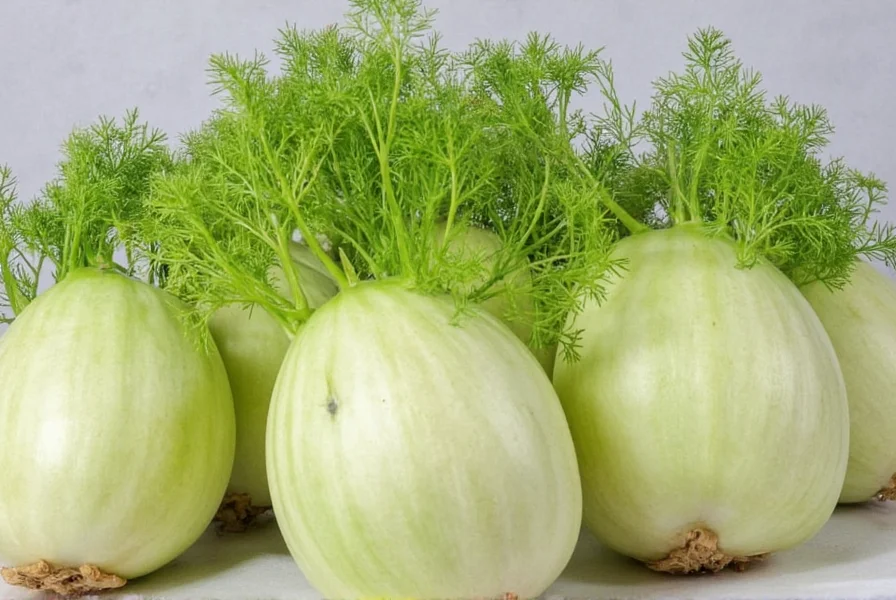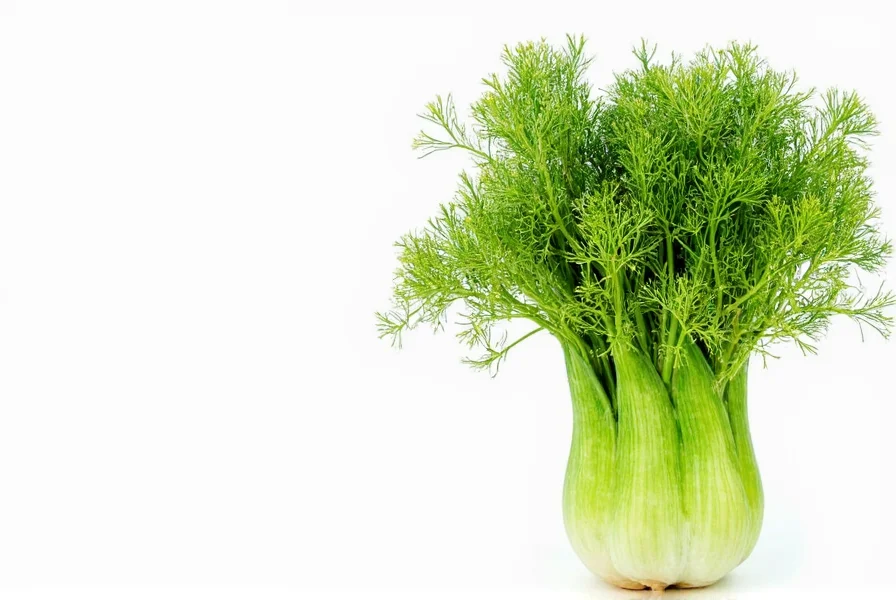Fennel (Foeniculum vulgare), a flowering plant in the carrot family, has been valued for both culinary and medicinal purposes for centuries. Modern research continues to validate many of the traditional uses of this versatile herb, revealing a range of scientifically supported health properties that make it a valuable addition to a health-conscious diet.
Nutritional Profile of Fennel
Fennel bulb and seeds contain a powerful combination of vitamins, minerals, and phytochemicals. One cup (170g) of raw fennel bulb provides:
| Nutrient | Amount per Cup | Daily Value % |
|---|---|---|
| Calories | 73 | 4% |
| Fiber | 7.3g | 26% |
| Vitamin C | 20.4mg | 23% |
| Vitamin K | 42.7mcg | 36% |
| Potassium | 689mg | 20% |
| Folate | 45mcg | 11% |
Fennel seeds, though consumed in smaller quantities, are even more concentrated sources of certain nutrients and bioactive compounds, particularly anethole, which gives fennel its distinctive flavor and many of its health properties.
Digestive Health Benefits of Fennel
Fennel's most well-documented health property is its ability to support digestive health. Multiple studies have confirmed fennel's antispasmodic effects on the gastrointestinal tract.
Research published in the Journal of Ethnopharmacology demonstrated that fennel seed oil reduced intestinal spasms and improved symptoms in patients with irritable bowel syndrome (IBS). The active compounds in fennel, particularly anethole and fenchone, help relax smooth muscle tissue in the digestive tract, reducing bloating, gas, and abdominal pain.
Clinical evidence supports fennel's traditional use for infant colic. A double-blind study found that fennel seed oil emulsion reduced crying time in 65% of colicky infants compared to 23.7% in the control group. This makes fennel tea a common recommendation for breastfeeding mothers seeking natural remedies for infant digestive discomfort.
Anti-Inflammatory and Antioxidant Properties
Fennel contains numerous compounds with significant anti-inflammatory and antioxidant activity. The primary compound, anethole, has demonstrated potent anti-inflammatory effects in laboratory studies by inhibiting the production of pro-inflammatory cytokines.
Additional research in the Journal of Food Science and Technology identified flavonoids, phenolic compounds, and volatile oils in fennel that contribute to its antioxidant capacity. These compounds help neutralize free radicals, potentially reducing oxidative stress that contributes to chronic diseases including heart disease and certain cancers.
The antioxidant properties of fennel extend to liver protection. Animal studies suggest fennel extract may help protect against liver damage caused by toxins, though more human research is needed to confirm these effects.
Respiratory Health Support
Traditional medicine systems have long used fennel for respiratory conditions, and modern research provides some support for these applications. Fennel contains compounds with expectorant properties that may help loosen mucus and ease coughs.
A study in the Journal of Medicinal Food found that fennel extract demonstrated significant bronchodilatory effects, suggesting potential benefits for people with asthma or bronchitis. The anti-inflammatory properties of fennel may also help reduce inflammation in the respiratory tract.
Fennel tea remains a popular home remedy for sore throats and coughs, with its soothing properties providing symptomatic relief while the antimicrobial compounds may help address underlying infections.
Hormonal Balance and Women's Health
Fennel shows promise in supporting women's health through its potential phytoestrogenic effects. Research indicates that certain compounds in fennel may interact with estrogen receptors, potentially helping to balance hormones.
A clinical trial published in Complementary Therapies in Medicine found that fennel extract significantly reduced symptoms of premenstrual syndrome (PMS) compared to placebo. Participants reported decreased abdominal pain, headaches, and mood disturbances.
Additional studies suggest fennel may support lactation in breastfeeding women. Research indicates that fennel tea consumption increased milk production in mothers experiencing low milk supply, though more extensive human trials are needed to confirm these findings.
Cardiovascular Benefits of Fennel
Preliminary research suggests fennel may offer several cardiovascular benefits. The high potassium content in fennel bulb helps regulate blood pressure by counteracting the effects of sodium.
Animal studies have shown that fennel extract may help reduce cholesterol levels. Research in rats demonstrated that fennel supplementation lowered total cholesterol, LDL ("bad") cholesterol, and triglycerides while increasing HDL ("good") cholesterol.
The fiber content in fennel also contributes to heart health. Dietary fiber helps reduce cholesterol absorption in the gut and supports healthy blood sugar levels, both important factors for cardiovascular wellness.
Potential Anticancer Properties
While research is still in early stages, several laboratory studies suggest fennel compounds may have anticancer properties. Anethole, the primary component of fennel essential oil, has demonstrated potential in inhibiting the growth of certain cancer cells.
Research published in Cancer Letters found that anethole induced apoptosis (programmed cell death) in human breast cancer cells. Other studies suggest potential benefits against liver, colon, and skin cancers, though these findings are primarily from test tube and animal studies.
It's important to note that while these preliminary findings are promising, fennel should not be considered a cancer treatment. More human clinical trials are necessary to understand fennel's potential role in cancer prevention strategies.
Safety Considerations and Potential Side Effects
Fennel is generally recognized as safe when consumed in typical food amounts. However, certain precautions apply:
- People with allergies to plants in the Apiaceae family (carrots, celery, parsley) may experience allergic reactions to fennel
- Excessive consumption of fennel seed oil may cause neurotoxic effects due to compounds like estragole
- Pregnant women should avoid medicinal amounts of fennel as it may stimulate uterine contractions
- Fennel may interact with certain medications including estrogen therapies and anticoagulants
The European Medicines Agency recommends limiting fennel seed oil to no more than 0.5-1.0 mL per day for adults due to potential neurotoxicity at higher doses. Culinary use of fennel bulb and moderate tea consumption are generally considered safe for most people.

How to Incorporate Fennel into Your Diet
Adding fennel to your diet is simple and versatile. Here are practical ways to enjoy fennel's health properties:
- Raw in salads: Slice the bulb thinly and add to green salads for a crisp, slightly sweet flavor
- Roasted: Toss fennel wedges with olive oil and roast until caramelized for a sweet side dish
- In soups and stews: Add chopped fennel to broths for enhanced flavor and nutrition
- Fennel tea: Steep 1-2 teaspoons of crushed fennel seeds in hot water for 5-10 minutes
- With fish: Fennel pairs exceptionally well with seafood in cooking
- As a breath freshener: Chew a few fennel seeds after meals for fresh breath
For maximum health benefits, use both the bulb and seeds. The bulb provides fiber and water-soluble vitamins, while the seeds contain higher concentrations of essential oils and certain antioxidants.
Conclusion
Fennel offers a compelling combination of culinary versatility and scientifically supported health properties. From digestive support to anti-inflammatory benefits, this ancient herb continues to demonstrate relevance in modern health practices. While not a miracle cure, incorporating fennel into a balanced diet provides a natural way to support multiple aspects of health.
The research on fennel's health properties, while promising, continues to evolve. Current evidence supports its traditional uses for digestive health and suggests potential benefits for inflammation, respiratory issues, and hormonal balance. As with any natural remedy, fennel works best as part of a comprehensive approach to health rather than as a standalone solution.
Frequently Asked Questions
What are the main health benefits of fennel seeds?
Fennel seeds offer several health benefits including digestive support through antispasmodic effects, respiratory relief for coughs and bronchitis, and potential hormonal balancing properties. They contain concentrated amounts of anethole, which has anti-inflammatory and antioxidant properties. Fennel seeds also provide dietary fiber, minerals like calcium and iron, and volatile oils that support gut health and may reduce bloating and gas.
Can fennel help with bloating and digestive issues?
Yes, fennel is well-documented for its ability to reduce bloating and digestive discomfort. The active compounds in fennel, particularly anethole, have antispasmodic effects that relax smooth muscles in the digestive tract. Clinical studies show fennel seed oil can significantly reduce symptoms of irritable bowel syndrome (IBS) and infant colic. Fennel tea is a traditional remedy for gas and bloating, with research supporting its effectiveness in reducing abdominal pain and discomfort.
Is fennel safe during pregnancy?
Fennel in culinary amounts (as a food ingredient) is generally considered safe during pregnancy. However, medicinal amounts of fennel, particularly fennel seed oil or concentrated supplements, should be avoided during pregnancy as they may stimulate uterine contractions. Some compounds in fennel have estrogen-like effects that could potentially affect pregnancy. Pregnant women should consult their healthcare provider before using fennel for therapeutic purposes, though moderate consumption as part of a normal diet is typically acceptable.
How does fennel compare to anise in terms of health properties?
While fennel and anise share a similar licorice-like flavor due to the compound anethole, they have some differences in health properties. Fennel contains additional compounds like fenchone that provide broader digestive benefits. Fennel bulb offers significant nutritional value with fiber, vitamin C, and potassium that anise seed lacks. Both have antispasmodic and expectorant properties, but fennel demonstrates stronger evidence for digestive applications, while anise may have slightly stronger expectorant effects. Fennel generally has a more comprehensive nutritional profile compared to anise.
What's the best way to prepare fennel for maximum health benefits?
To maximize fennel's health benefits, use both the bulb and seeds. For the bulb, eat it raw in salads to preserve water-soluble vitamins, or lightly steam it to maintain nutrients while improving digestibility. For seeds, crushing them before use releases more essential oils - try making fennel tea by steeping 1-2 teaspoons of crushed seeds in hot water for 5-10 minutes. Roasting fennel bulb brings out natural sweetness while preserving most nutrients. Avoid overcooking fennel to maintain its beneficial compounds, and store fresh fennel in the refrigerator for up to 5 days to preserve freshness and nutrient content.











 浙公网安备
33010002000092号
浙公网安备
33010002000092号 浙B2-20120091-4
浙B2-20120091-4